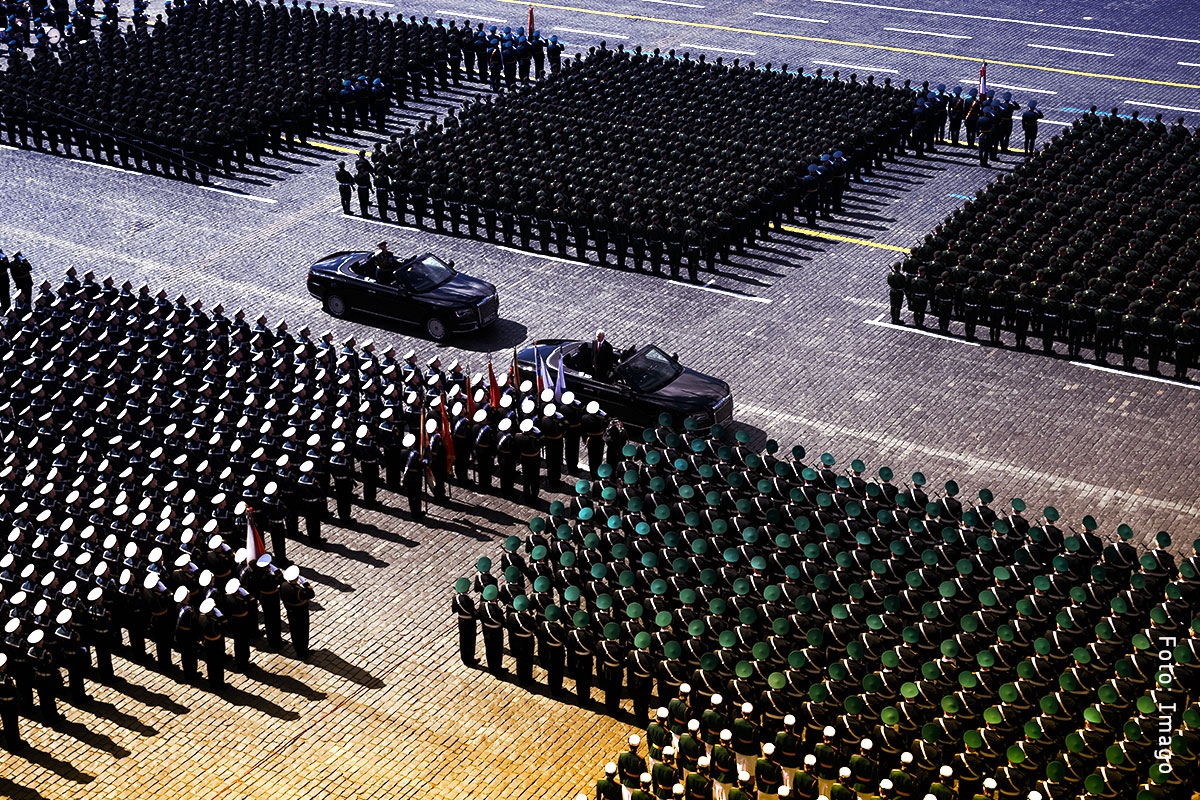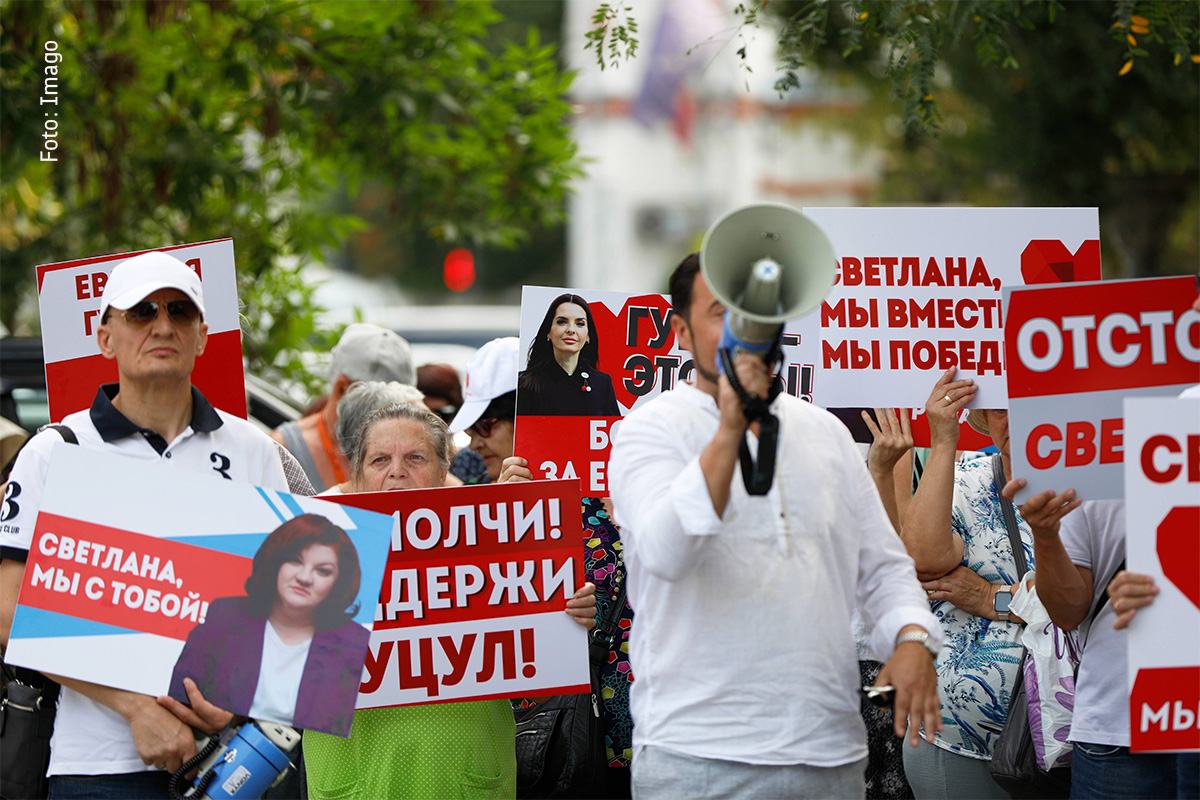“A tiny mistake could escalate the whole situation”

In Gaza, the Israeli army is currently fighting the Hamas, while at the same time the ongoing conflict with the Hezbollah in the north is at the brink of escalation. Is there a two-fronts war ahead for Israel? Till Schmidt talks with political scientist Matthew Levitt.
Matthew Levitt, US-American political scientist and Middle East expert is director of the “Jeanette and Eli Reinhard Program on Counterterrorism and Intelligence” and professor of the “Georgetown University Center for Security Studies” in Washington D.C.. He has done extensive research on Hamas as well as on Hezbollah. Levitt is frequently publishing in various US-American journals and newspapers and has been expert witness in several terrorism trials. In November, an expanded new edition of his book on Hezbollah will be published „Hezbollah. The Global Footprint of Lebanon’s Party of God“ (Hurst Publishers)
Mr Levitt, you have done extensive research on terror networks with special focus on Hamas and Hezbollah. Watching the current news today, we are worried: A potential escalation between Israel and Hezbollah seems on the horizon. It could transform their ongoing war of attrition into a full-scale war – which would mean wider regional repercussions and devastating consequences for both countries and its citizens. In a nutshell — what is the situation between Israel and Hezbollah today, as we speak in the evening of July 1st?
It is tense. Hezbollah has decided to continue firing into Israeli communities on a regular basis. That has led to the evacuation of some 70,000 to 90,000 Israeli civilians and has created a situation where Israel feels it cannot tolerate it anymore. Since October 7th, there has been an escalation ladder that Hezbollah has climbed from time to time, going up and down: in terms of using more sophisticated and more dangerous longer-range munitions, targeting more sensitive sites, and being closer to or even in the middle of residential areas — including the Northern Command headquarters in Safed, for instance.
Hezbollah’s General Secretary, Hassan Nasrallah, has pledged that firing into Israeli communities will continue until there is a ceasefire, or at least a pause in Gaza.
The problem is that this gives Yahya Sinwar, the Hamas leader in Gaza, leverage and a veto over whether there will be an escalation on the Lebanese-Israeli border. Sinwar understands that if he does not sign a ceasefire deal, then Hezbollah keeps shooting, which is to his benefit. However, regardless of their rhetoric, neither Israel nor Hezbollah want a full-scale war. Both seem to believe that the current fighting and even surges in the stages can be contained.
However, the US and many European governments have been warning that this should not be taken for granted. It takes only one mistake, one miscalculation, for the situation to escalate into a full-scale war. It is important to understand that any war with Hezbollah would be much different and much more dangerous, for both Lebanon and Israel. Hezbollah is much larger, better armed and equipped with many more rockets, and much closer to Iran than Hamas.
Could you please unpack Hezbollah’s rationale for having decided to climb the escalation ladder?
For a long time, Hezbollah was distracted from direct terrorist actions against Israel because it had been fighting in Syria for several years. During that time, it did invest in the long term: in tunnels, rocket systems, and other things clearly affecting Israel. But it was not taking action by shooting at Israel. After deploying from Syria, Hezbollah looked for ways to reassert its resistance credentials without engendering a massive response from Israel.
Before October 7th, Hezbollah did not necessarily respond unless Israel did something in Lebanon or killed a Hezbollah operative in Syria. But every time Israel did something of minor importance, like blowing up a truckload of rockets from Iran to Hezbollah, it did not respond. Since October 7th, Hezbollah has sought to position itself as the defender of Palestinians and at the forefront of the ‘axis of resistance,’ the Iran-led network that is challenging Israel’s very existence. Thus, Hezbollah has been looking for ways to reset the rules of the game.
Hezbollah is sworn to Israel’s destruction. What constraints are holding them back in the current situation?
Hezbollah sees very clearly that nobody in Lebanon wants the kind of destruction that everybody knows is going to come if there is a full-scale war. There are already a lot of things that have caused Hezbollah some domestic discomfort over the past few years, such as the enormous economic crisis, the assassination of Rafik Hariri, thwarting the investigation for the explosion in the Beirut port, and blocking anybody as president who is not a close ally of theirs. Hezbollah is concerned that many Lebanese would hold Hezbollah accountable for a war with Israel. They would not be satisfied with hearing that Israelis would suffer, too.
What is Iran’s role in that situation?
Hezbollah understands that Iran really does not want them to expend too much of their ammunitions. They do not want Hezbollah to fire and lose too many rockets to Israeli strikes, because Iran sees those rockets as the best deterrent against an Israeli or any other attack on their nuclear program, and as a second-strike capability if anybody would do it. Coming on the heels of the Iranian attack on Israel in April, the Israeli reprisal attack, which was, frankly, far more limited and far more successful, was not stopped by Iranian-Russian air defences and targeted those air defences right next to a nuclear facility in Isfahan. The Iranians got the message.
For Hezbollah, Israel is an object for ideological projections and a deadly enemy to be fought by all means. However, Israel is also a state that acts with political and military power. What role does Israeli agency play in Hezbollah’s rationale?
As October 7th made clear, Hezbollah and the other parts of the ‘axis of resistance’ truly believe that they will destroy Israel. The problem is that Westerners tend to see things in the now. October 7th was never intended to destroy Israel within days, or months, or even years. There is an element of strategic patience built into their persistent warfare, the so-called muqawama. They understand that around October 7th, there was a window of opportunity to target Israel and try to set in motion an irreversible process leading to its destruction.
Hezbollah, Iran, and Hamas understood that Israel was going through significant social and political upheaval over internal political issues relating to the judicial process. Eight months after October 7th, they still see Israel as being weaker than it was, with the whole world’s perspective on Israel changing. They see tensions with the United States, Israel’s key ally. They see tensions with Europe. They see students protesting against Israel’s right to exist and threatening or carrying out violence against non-Israelis who admit to being Zionists. When Hezbollah says that they are about the liberation of Jerusalem and creating a Palestinian state over all of historic Palestine, it does not mean it will be tomorrow. It is a long-term, strategic goal.
How does Hezbollah look at the recent Supreme Court ruling that lifts the exemption of the ultra-Orthodox Haredim from army service? Are the subsequent protests another window of opportunity for Hezbollah?
Hezbollah follows all things domestic very closely and in Hebrew. It is a sign of the professionalism of their kind, of intelligence, effort and understanding. Given the case that this issue is put to bed and only the crème de la crème of the ultra-Orthodox who showed tremendous skill and gift in religious study, get to avoid national service by studying religious texts, it would bring in Israel a whole bunch of manpower; if not in combat units, then for stocking shelves, teaching children, or doing some kind of national service. Yet Hezbollah also understands that the Supreme Court ruling is something that could break Netanyahu’s current coalition, which relies on ultra-Orthodox parties. However, a more centrist, less divisive government would not affect the deployment along the northern border.
What is the relationship between Hezbollah and Hamas?
The main and only significant difference is that Hezbollah is Shia and Hamas is Sunni. And the second is that Hezbollah is quite large and is, at this point, effectively part of the Quds Force and so close to Iran. Hamas is a trusted proxy, but a small proxy. Hezbollah has provided training to Hamas people sometimes, but more importantly, it has been a vehicle through which the Iranians have sent over money to Hamas. So, there is a little bit of a pay-to-play or pay-for-slay. If you want to get paid, you’ve got to deliver.
The relationship between Hamas and Hezbollah officials is deep, some of them going back decades. Remember, in 1992, the Israelis deported some 418 Hamas and Palestinian Islamic Jihad operatives to a hilltop in southern Lebanon, effectively decimating the brigades of both organizations. The downside for the Israelis is that Hezbollah came over and helped the deported operatives build tents. That is how Hamas first learned how to get good at suicide bombing. The relationship really blossomed from there. For all of them, the Palestinian cause and the destruction of Israel are extremely animating.
In a recent piece in Foreign Affairs, you have argued that in a post-war Gaza, Hamas seeks to transform along the “Hezbollah model.” Could you explain that?
Hamas thinks that governance in Gaza is withholding them from being able to fight Israel effectively. They want to be part of a governing coalition and not the solely responsible government, like Hezbollah, which has ministers in the government and members of parliament but does not constitute its own government nor place Hassan Nasrallah in a government position. Furthermore, Hezbollah maintains an independent military independent of Lebanon, which makes decisions on war and peace, and life and death for all Lebanese. Hamas wants the same in the Gaza Strip, and Iran would love to be able to facilitate that.
Would such a transformation also include Hamas conducting terrorist attacks in Europe?
It would indeed become more likely. Recently, there were Hamas plots in Berlin and in Stockholm. In both cases, there were elements and individuals in the Netherlands and Denmark, as well as activity in Bulgaria. This was really a significant shift for Hamas, which had never carried out an attack abroad. It talked about it, tried to do it at least once before, but twice now since October 7th through Hamas operatives, some of whom were known in advance as European-based financiers for Hamas. So, European authorities are looking at those people in a quite different light now. What is interesting is that the guys in Germany, Sweden, and elsewhere were taking orders from Hamas leaders in Lebanon. That has led some to fear, at least, that there could be ties to Hezbollah, too.
In 2020, Germany has banned Hezbollah. What do you know about still existing networks?
Hezbollah has significant networks of Hezbollah members and supporters in Europe, in the U.S., and elsewhere. Every year, German intelligence reports at least nine hundred persons or supporters. Over the last few years, Germany has shut down several Islamic centres and organizations, as well as children’s projects for funding or doing other things for Hezbollah. Last week, for the first time, there were convictions of individuals for being members of Hezbollah. Its networks are something that authorities are taking very seriously these days. In Germany and in other countries, this concern grows just as things get more dangerous back in the Middle East, with the potential for it to spill over and escalate elsewhere.
![]()
Hat Ihnen unser Beitrag gefallen? Dann spenden Sie doch einfach und bequem über unser Spendentool. Sie unterstützen damit die publizistische Arbeit von LibMod.
Spenden mit Bankeinzug
Spenden mit PayPal
Wir sind als gemeinnützig anerkannt, entsprechend sind Spenden steuerlich absetzbar. Für eine Spendenbescheinigung (nötig bei einem Betrag über 200 EUR), senden Sie Ihre Adressdaten bitte an finanzen@libmod.de
Verwandte Themen
Newsletter bestellen
Mit dem LibMod-Newsletter erhalten Sie regelmäßig Neuigkeiten zu unseren Themen in Ihr Postfach.





